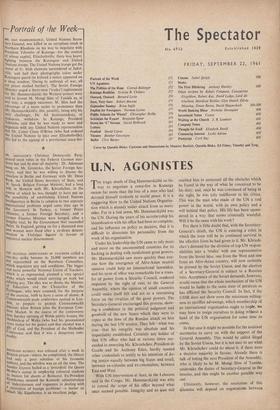- -Portrait of the Week— MR. DAG HAMMARSKIOLD, United Nations Secre-
tary-General, was killed in an aeroplane crash in Northern Rhodesia on his way to negotiate with President Tshombe of Katanga—for the control of whose capital, Elizabethville, there was heavy fighting between the Katangese and United Nations troops. The United Nations troops got the worst of it: Irish elements surrendered at Jadot- vale, and had their photographs taken under Katangese guard (in Ireland a notice appeared on It shop window, 'Owing to outbreak of war, all cut prices slashed further'). The Soviet Foreign Minister urged a three-man ('troika') replacement for Mr. Hammarskjold; the Western'powers were said to favour M. Mongi Slim of Tunisia as, at any rate, a stopgap successor. M. Slim had the advantage of a name easier to pronounce than Mr. Hammarskjold's; this, possibly, being why his milli challenger, Dr. Ali Sastroamidjojo, of Indonesia, withdrew. In Katanga, President Tshombe said that he was ready to meet and negotiate with any United Nations representative but Dr. Conor Cruse O'Brien (who had ordered the United Nations to take over Elizabethville); this led to the signing of a provisional cease-fire.
*
IM. ADENAUER'S Christian Democratic Party gained most votes in the Federal German elec- tions but lost its over-all majority: Dr. Adenauer hung on. Mr. Gromyko, the Soviet Foreign Sec- retary, said that he was willing to discuss the situation in Berlin and Germany with Mr. Dean Rusk, the United States Secretary of State, and M. Spaak, Belgian Foreign Minister, had a long talk in Moscow with Mr. Khrushchev, in the course of which he was thought to have put up the possibility of establishing United Nations headquarters in Berlin (a solution to two separate international problems urged some time ago in the Spectator). In Turkey, a former Prime Minister, a former Foreign Secretary, and a former Finance Minister were hanged, after a lengthy trial, by the Government that succeeded theirs. In England, getting on for a thousand men and women were fined after a sit-down demon- stration in Trafalgar Square in favour of unilateral nuclear disarmament.
irliP NATIONAL ASSOCIATION OF TEACHERS called a mle-day strike because its 26,000 members are not represented on the Burnham Committee. Which negotiates pay and conditions. The bigger and more powerful National Union of Teachers, Which is so represented, planned a very special strike which would entail carrying on work but refusing pay. The idea was to shame the Minister of Education and the Chancellor of the Exchequer, who were assumed, for the purpose or the exercise, both to have a sense of shame. A Commonwealth trade conference opened in Lon- to prepare to protect Commonwealth Interests when Britain joins the European Com- m00 Market. In the course of the controversy rwer Sunday opening of Welsh public houses, the Archbishop of Wales (who had his processional cross stolen for his pains) said that alcohol was a Conference of God, and the President of the Methodist k-onference said that it was a dangerous com- modity.
SERTRAND RUSSELL was released after a week in Brixton prison—where, he complained, the library had only a poor selection of his favourite authors, and the wireless was on all the time. The Sunday Express hailed as a 'precedent' the Queen Mother's action in employing coloured students as beaters for shoots at Balmoral. Ex-President Eisenhower accused the Kennedy administration Of 'indecisiveness and vagueness in dealing with 4 succession of foreign problems'—a matter on Which Mr. Eisenhower is an excellent judge.










































 Previous page
Previous page